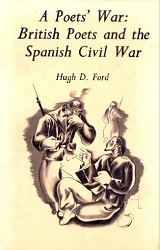Here we have a prime example of why you wouldn't want Henry Reed to review your book. He simply disassembles the author, Hugh D. Ford, and then settles in to attack his book, A Poets' War: British Poets and the Spanish Civil War (1965), and wraps up with a quick assay of the subject matter:

Robin Skelton reports that W.H. Auden referred to his own Spanish Civil War poems as 'trash' in the preface to Poetry of the Thirties (Harmondsworth, England: Penguin, 1964). This issue of the Sunday Times also contains a review of Vincent Brome's The International Brigades: Spain 1936-1939, by Stephen Spender.
Spain, '36-'39: no art out of war
A POET'S WAR: British Poets and the Spanish Civil War
by Hugh D Ford/Oxford, for the University of Philadelphia 48s
By Henry Reed
ONE of the major traditions in the English departments of American universities is the ritual production, by advanced students, of a PhD thesis. It is a further tradition, only rarely broken with, that the basic subject of the thesis shall be of microscopic dimensions and even smaller importance; the test for the student appears to be how far he can make it stretch, either by irrelevant digression, or by simple repetition. All being well, his thesis is accepted, the PhD achieved.
By this time the ex-student has become an obsessional: after a little pause he returns to his subject, and decides that a few extra chapters might not come amiss. He adds not only these, but also a forty-page bibliography consisting largely of books unreferred to in the text, and a three-page preface giving separate thanks to pretty well everyone he has met since the age of five, ending with his wife, whom he refers to in expressions of tender gratitude which must sometimes come as rather a surprise to her. The result is a book.
Mr Ford gives us a book. Of the two stretching-methods I have referred to, Mr Ford prefers simple repetition. The basic materials he selects are, after all, extremely scanty: two dozen or more inoffensive poems about the Spanish Civil War, few of them with any particular merit, and many by names that have never been seen outside the journals of the time. These writers are of course fairly distinct from each other: all they have in common, apart from their allegiance to the Republicans, is an incapacity for memorable speech. Most of their authors would probably not even bother to own the poems by now. Yet Mr Ford contrives to blur any distinctness that may be discovered in them, by ruthlessly submitting to each and every one of them the same examination paper.
He conducts this as a viva voce with no replies allowed except his own: Is such-and-such a poet sacrificing personal sincerity to politics? Is he writing propaganda? Doesn't the reference to so-and-so in stanza two introduce too personal a note if complete identification with Communism is the aim? I can't believe that anyone can possibly care about this. There are roughly 150 pages of it; and the unfortunate poems are up to the neck in it.
From the later stages of this morass, which grows denser with repetition, there rise up with an unexpected look of genuine durability about a dozen poems by names well known before the war in Spain. These include Auden's "Spain," which its author has recently described in print as "trash," half a dozen well-controlled poems by Spender, a few pages of deceptively casual vividness by MacNeice, three or four lyrics by Herbert Read, and Day Lewis's narrative poem "The Nabara."
These poems, and possibly a few others, have survived the epoch in which they were written, and this, I gather, Mr Ford, after much cautious mumbling and bumbling, concedes. Some of them—Spender's subdued elegies, for examples—seem in some odd way better than they did when they first appeared. There seems no point in re-inserting any of these distinguished works into their historical context; just as, in reverse, there seems no longer any point in isolating the Spanish War from the years of ever-spreading Fascism that led to it, and the world war which Franco's success perhaps made inevitable. To those who followed its fortunes, the Spanish War had a particularly sharp and saddening taste, which we may on occasion suddenly recall: a true imaginative and creative gesture might still be made from memory of it. But on the subject of the gestures made at the time, half a dozen succinct pages should by now be enough.







